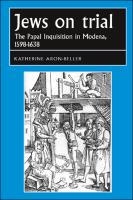Jews on trial
The Papal Inquisition in Modena, 1598–1638
Author(s)
Aron-Beller, Katherine
Collection
Knowledge Unlatched (KU)Number
104241Language
EnglishAbstract
This book explores two areas of interest: the Papal Inquisition in Modena and the status of Jews in an early modern Italian duchy. Its purpose is to deepen existing insights into the role of the former and thus lead to a better understanding of how an Inquisitorial court assumed jurisdiction over a practising Jewish community in the seventeenth century. The book highlights one specific aspect of the history of the Jews in Italy: the trials of professing Jews before the Papal Inquisition at the beginning of the seventeenth century. Inquisitorial processi against professing Jews provide the earliest known evidence of a branch of the Papal Inquisition taking judicial actions against Jews on an unprecedented scale and attempting systematically to discipline a Jewish community, pursuing this aim for several centuries. The book focuses on Inquisitorial activity during the first 40 years of the history of the tribunal in Modena, from 1598 to 1638, the year of the Jews' enclosure in the ghetto, the period which historians have argued was the most active in the Inquisition's history. It argues that trials of the two groups are different because the ecclesiastical tribunals viewed conversos as heretics but Jews as infidels. The book emphasizes the fundamental disparity in Inquisitorial procedure regarding Jews, as well as the evidence examined, especially in Modena. This was where the Duke uses the detailed testimony to be found in Inquisitorial trial transcripts to analyse Jewish interaction with Christian society in an early modern community.
Keywords
Art; History; Renaissance; History; JewishISBN
9781526151629Publisher
Manchester University PressPublisher website
https://manchesteruniversitypress.co.uk/Publication date and place
2011Grantor
Imprint
Manchester University PressClassification
History of art
Social and cultural history


 Download
Download